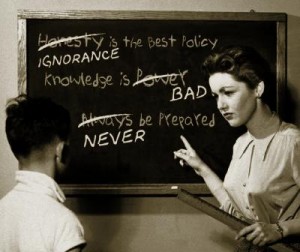Welcome to the Wakefield Doctrine (the theory of clarks, scotts and rogers)
So, guess this gives proof to the notion that we, all of us, have within, all elements of the three predominant worldviews that make up, (as opposed to ‘make up for’), the personality theory continued/exhibited/manifested and otherwise made available in these pages.
New Reader? Tempting as it might be to try to take the position that given how irrefutable it may seem that at one time, (or another), you clearly exhibit the primary characteristics of one (and then the other (and finally, well, would you look at that! the other)) personality types.
It doesn’t work that way. One predominant worldview to a customer. For life.
Why? Well, look at it this way: the fundamental tenant (or is that, tenent?) is that personality type is a reflection, indication and evidence of the relationship a person maintains with the world around them (and the people who make it up). It is our experience of reality (Hint: that of an Outsider, a Predator or a Herd Member) that shapes the self those around us witness.)
It only makes sense. The primary job of the infant human is to develop successful strategies for survival and thrival* Find yourself in the reality of the Outsider and you’ll learn to learn (on the down-low) and to keep a low profile; look around at the (metaphorical) savannah of Life that seems to be nothing less than an Open-Air McDonalds, (mostly burger ‘n fries-seeking-lifeforms but…cruising the vast Parking Lot (of Life) not a few bigger (and hungrier) Predator types… you get the pitcha. Anyway… the Doctrine only works with this three-way symmetry. So why would one want to argue against the premise? oh yeah, there are always Herd Members in the crowd.
Enough of this!
RePrint! RePrint!!! Reprint!!?
Full Disclosure: had to read a bunch of Doctrine posts to find the Original T-Giving Post. Ever one liked it so much, the electrons had barely faded-out when I was all RePrinty. In any event, here ya go from (don’t do the math!) 201o
J’accuse!* that turkey did not commit suicide!…the Wakefield Doctrine Holiday-style
November 23, 2011Welcome to the Wakefield Doctrine ( the theory of clarks, scotts and rogers) on this eve of Saint rogers’s Day!
Thanksgiving Day1 is the holiday that, if we did not already know that there exists a personality type referred to as a roger, someone would have pointed it out to us. Perhaps the task would have fallen to an Art Professor in a land grant college somewhere in the Midwest. We can imagine the epiphany …in the middle of the night (during his sabbatical devoted to the study of the works of Norman Rockwell),
” My god! Norman’s work is not just a robust and healthy celebration of paedophilia! He has been trying to tell us to transform our culture! …for all good Americans to come forth and show their appreciation of patriotism, consumerism and child-abuse!!”We have, from time to time, been accused of indiscriminate use of hyperbole in these pages, however, just consider the astounding level of pervasiveness of the ‘Holiday of Thanksgiving’. It is not enough to close the Post Office system and all other government agencies2, no it is not. This Holiday actually attempts to compel normal, rational, adult people to sit in front of the television and watch a Parade involving giant balloon representations of out-of-print newspaper cartoon characters! Who the hell watches the Macy’s Day Parade on purpose?!? Throughout the entire morning of Thanksgiving, you simply cannot escape the pageantry and spectacle, broadcast live and has, as the ’emcees’, News Anchors from the major networks morning news shows! ( “Thats right, Matt! That’s Kenny Chesney and Taylor Swift on the Snoop Dog float… it says here that her eye makeup took 12 hours and 6 pounds of aluminum foil chips to create!!” ). Like a Hieronymus Bosch painting done in ‘live-action’, the whole country is exposed to hours and hours of Macy’s Thanksgiving Day Parade… more than 3 hours of parade music and floats (” … hey, Anne isn’t the next float from your hometown”? “That’s right Al! it’s my old Alma mater, the East Clydesdale High School Marching Band playing a medley, ‘Straight outta Compton’, ‘Fuck tha Police’ and ‘Gangsta Gangsta’ )
Why do we say Thanksgiving is the most rogerian of all holidays? Simply because Thanksgiving is about the how, not the why. As a cultural event, this particular holiday tells it’s participants exactly what to do; what to eat and how to cook it! Taught from childhood, every member of our culture knows precisely how (and) where they are expected to spend the Holiday! Thanksgiving is about family! And if there is anything that rogers fake better than anyone, it is the joyful appreciation and celebration of the family.
But don’t just take our word for it! Following is an excerpt from a Post of the Wakefield Doctrine that was written over a year ago! (and nothing says credibility better than…age)
We all know that “the holidays” are experienced differently by each of the three (clarks, scotts and rogers) and therefore the demands of the celebrations are a very effective illustration of the nature of each. But if there was no Thanksgiving, a roger would have invented it! (Actually, they probably did). Think about it! A holiday celebration that is:
- based on a factual historical event (sort of)
- the protagonists (of the story) are religious refugees, persecuted and driven away, together, on boats
- food, specific food and a not-to-be-deviated-from Menu
- ritual menu and a full schedule of events
- shopping in herds, as the climax of the celebration (Black Friday)
- a moral taught to the young: we came here, those strangers who helped us were different, (…we had a feast and wiped out their culture)
I will be so bold as to suggest that there is no more rogerian a holiday than Thanksgiving! And since we are on the subject of rogers and holidays, (sort of), is there any human activity that is more one sided, over-hyped, ‘expectations-sure-to-fall short’, (not counting sex on the eve of a relationship breaking up), than Parades? I don’t care if you’re a trombone player in the middle of the herd or someone sitting in their living room watching it on TV, nothing says roger better than Parades!
* As a result of the popularity of (Zola’s) letter, even in the English-speaking world, J’accuse! has become a common generic expression of outrage and accusation against someone powerful
1) the Day that the indigenous people of the North American continent made a gift of their lands and cultures and cuisine to their new European friends.
2) you do know about the Post Office and rogers, don’t you?
* not a ‘real’ word












